

Amy K. S.O.S. for Information Literacy- Boolean Logic Lesson. This is a 40 minute lesson that can take place in the library media center or the classroom. Benjamin: Basic Research Strategy - Step-by-Step Guide & Research Rescue - Subject Guides at Brigham Young University. Research can seem intimidating at first, and can be the most difficult part of an assignment.
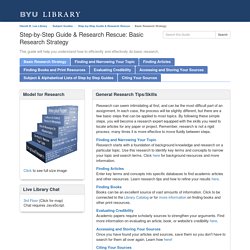
In each case, the process will be slightly different, but there are a few basic steps that can be applied to most topics. By following these simple steps, you will become a research expert equipped with the skills you need to locate articles for any paper or project. Remember, research is not a rigid process; many times it is more effective to move fluidly between steps. Finding and Narrowing Your TopicResearch starts with a foundation of background knowledge and research on a particular topic.
Use this research to identify key terms and concepts to narrow your topic and search terms. Finding ArticlesEnter key terms and concepts into specific databases to find academic articles and other resources. POGIL (Caroline) Doing Research (Cathy)
UM Library Fake News Course - David Section 90. The slides for the LOEX 2018 session entitled Fake News, Lies, and a For-credit Class: Lessons Learned from Teaching a 7-Week Fake News Undergraduate Library Course can be seen on the right.
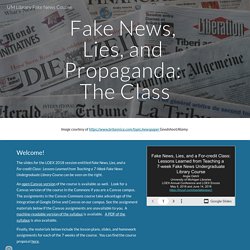
An open Canvas version of the course is available as well. Look for a Canvas version of the course in the Commons if you are a Canvas campus. The assignments in the Canvas Commons course take advantage of the integration of Google Drive and Canvas on our campus. See the assignment materials below if the Canvas assignments are unavailable to you. A machine-readable version of the syllabus is available.
Finally, the materials below include the lesson plans, slides, and homework assignments for each of the 7 weeks of the course. The Lowdown Fake News Lesson Plan (Gil) Fake News Lesson Plan (Gil) S.O.S. for Information Literacy (Kristen) In advance of the class, the librarian will choose a pair of articles to use as examples.
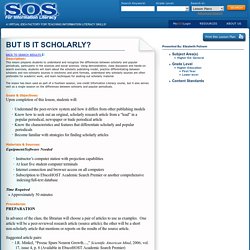
One article will be a peer-reviewed research article (source article); the other will be a short non-scholarly article that mentions or reports on the results of the source article. Suggested article pairs: · J.R. Minkel, “Prozac Spurs Neuron Growth…,” Scientific American Mind, 2006, vol. 17, issue 4, p. 8 (Available in EbscoHOST Academic Search Premier) Matt U. - Wiki Education – Connecting Higher Ed and Wikipedia. Matt U. - Radical Teacher (University of Pittsburgh journal) Max: Lesson Plans – Search Education – Google. Picking the right search terms Beginner Pick the best words to use in academic searching, whether students are beginning with a full question or a topic of just a few words.
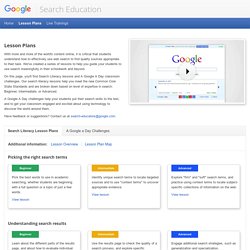
View lesson Advanced Explore "firm" and "soft" search terms, and practice using context terms to locate subject-specific collections of information on the web. Understanding search results Learn about the different parts of the results page, and about how to evaluate individual results based on cues like web addresses and snippets. Engage additional search strategies, such as generalization and specialization. Monisha: S.O.S. for Information Literacy - Using the OPAC. This lesson is intended to teach 4th graders to use the OPAC (Online Public Access Catalog) specific to a school (but could be modified to use in other schools/with other grade levels).
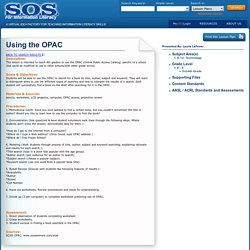
Students will be able to use the OPAC to search for a book by title, author, subject and keyword. Max: Intermediate 1: Picking the right search terms ★ Sarah : MLA : For Health Consumers and Patients : Find Good Health Information. A 2015 Pew Research Center Study reveals that "73% of all those ages 16 and over say libraries contribute to people finding the health information they need. 42% of those who have gone online at a library using its computers, internet connections or Wi-Fi have done so for health-related searches.
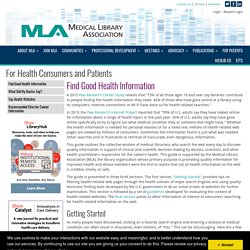
" In 2013, the Pew Research Internet Project reported that "59% of U.S. adults say they have looked online for information about a range of health topics in the past year. 35% of U.S. adults say they have gone online specifically to try to figure out what medical condition they or someone else might have. " Whether the health information is needed for personal reasons or for a loved one, millions of health-related web pages are viewed by millions of consumers. Sometimes the information found is just what was needed. Other searches end in frustration or retrieval of inaccurate, even dangerous, information. The guide is presented in three brief sections. Getting Started. Selecting Keywords to Search (Sophia) Sophia: Scholarly conversation, following the research on New Literacies Alliance portal. Selecting Keywords to Search (Sophia L.) Taylor: Research Credible Sources and Develop a Topic. In this lesson, students will learn to identify credible online sources and make an interactive research document in Google docs with basic coding.
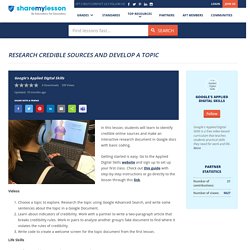
Getting started is easy. Go to the Applied Digital Skills website and sign up to set up your first class. Check out this guide with step-by-step instructions or go directly to the lesson through this link. Videos. Digital Resource Center, Center for News Literacy. Visual Aids and Descriptors in Primary Source Evaluation & Curation. STAR Search: How Do I Find the Book I Need? Home › Classroom Resources › Lesson Plans Lesson Plan Overview From Theory to Practice The STAR Search process outlines the steps an intermediate learner goes through in locating resources in the library for information gathering.
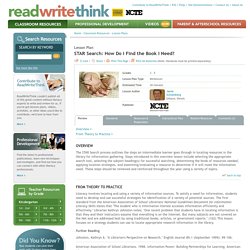
Steps introduced in this overview lesson include selecting the appropriate search tool, selecting the subject heading(s) for successful searching, determining the kinds of resources needed, applying location strategies, and examining/evaluating a resource to determine if it will meet the information need. Back to top. The Frog Beyond the Fairy Tale Character: Searching Informational Texts. Home › Classroom Resources › Lesson Plans Lesson Plan Overview Featured Resources From Theory to Practice Are frogs found on every continent?
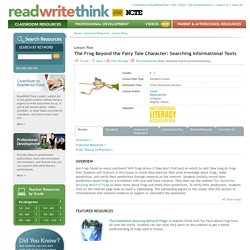
NIH: Finding and Evaluating Online Resources (Maggie Y. Section 90) What’s the Bottom Line?
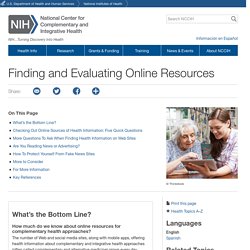
How much do we know about online resources for complementary health approaches? The number of Web and social media sites, along with mobile apps, offering health information about complementary and integrative health approaches (often called complementary and alternative medicine.
Damien: Librarianship Studies & Information Technology: (Section 91) Going Boldly Beyond the Reference Desk: Practical Advice and Learning Plans for New Reference Librarians Performing Liaison Work (Kyle Stanley) Common Sense Education:Finding Credible News (Cassondra McCarthy)